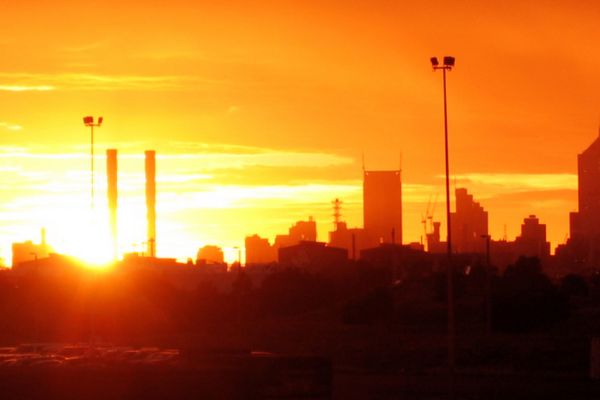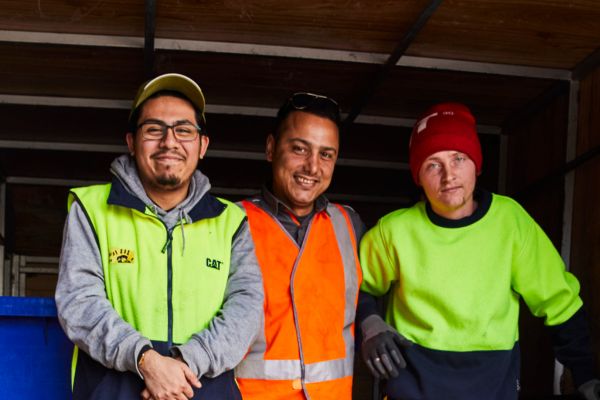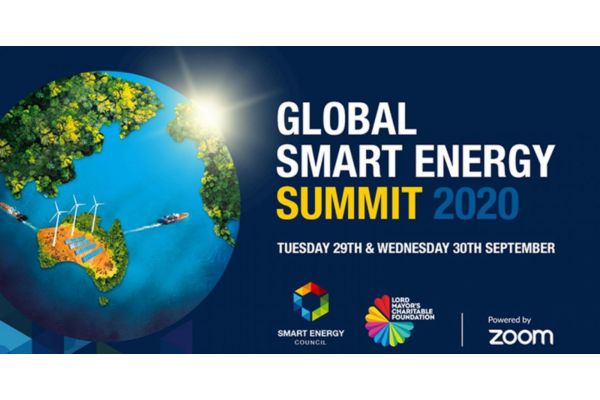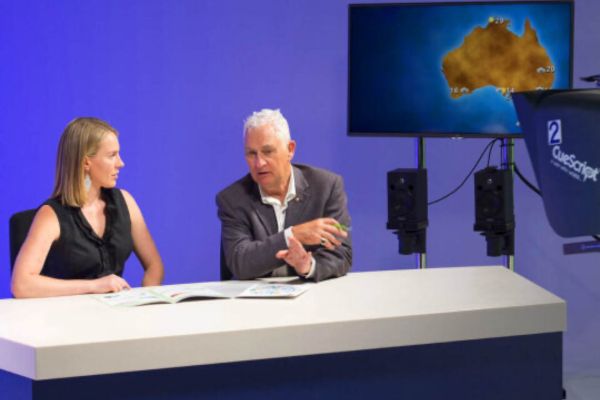In 2015, Lord Mayor’s Charitable Foundation CEO, Dr Catherine Brown OAM, was invited to Paris to attend the UN Climate Change Conference (COP21). While world leaders negotiated the Paris Agreement, philanthropy organisations from all over the world were briefed by a range of experts – including farmers, ministers and health experts – on the impacts of climate change. “COP21 was fraught, and it looked like it all might fail at one point. But it also made it clear that the rest of the world was ahead of Australia,” she says. “I wanted to learn everything I could about climate change.”
The experience marked a turning point – both for Catherine’s own thinking, and for the Foundation’s direction. On returning to Melbourne, Catherine proposed to the Foundation’s board that climate change should be at the centre of everything the Foundation does.
“I wanted to put a climate lens over everything,” she says.
Catherine stresses that collaborating and coordinating with other climate organisations and philanthropic groups is at the heart of the Foundation’s approach. Since 2016, the Foundation has aligned its impact areas with the UN’s Sustainable Development Goals on climate change, but also adjacent areas such as eradicating poverty and creating sustainable cities. The Foundation is also a member of the Australian Environmental Grantmakers Network (AEGN), the Foundations 20 Platform (F20), and the Worldwide Initiatives for Grantmaker Support (WINGS), all of which are collaborating to build climate-resilient communities. In 2021, the Foundation became Australia's first signatory to International Philanthropy Commitment on Climate Change, which encourages philanthropic groups across the world to consider their work through the climate lens.
Dr Karyn Bosomworth, the Foundation’s Program Manager for Healthy & Climate Resilient Communities, says that to tackle climate change, we need a broad range of perspectives.
“Philanthropy has a strong role in making sure those who are most vulnerable and under-served in the community are able to have a place at the table in shaping our city’s future,” she says. “There must be space for people to say, ‘These are the strengths we can bring, and these are the things that would help’.”
Community is at the heart of Karyn’s approach. Karyn says that COVID-19 provided a glimpse into the work we still need to do to prepare for climate change. COVID-19, she says, demonstrated the importance of our connections to each other, and revealed the weaknesses in our existing systems. It gave us a glimpse of how we might respond to the existential threat of climate change.
 The Foundation's Hot Spots Initiative was established to build community resilience to reduce the health and social impact of heatwaves.
The Foundation's Hot Spots Initiative was established to build community resilience to reduce the health and social impact of heatwaves. The Foundation’s strategic approach to grantmaking is about identifying solutions to Melbourne’s social and environmental challenges. One example is working with ‘next economy’ models and looking at alternatives that might address the economic disadvantage inherent in the current system.
In 2023, for example, the Foundation’s Next Economy Jobs Challenge, in partnership with the Paul Ramsay Foundation, will fund $800,000 in grants to organisations tackling transitions to more sustainable jobs, particularly with a climate-change lens. That is, creating jobs in waste management, renewable energy, sustainable food and housing, and construction.
This includes social enterprise Green Collect, which develops careers in waste management and recycles items that might otherwise end up in landfill. In this way, it tackles employment and climate simultaneously, building towards a circular economy, where reuse is the norm.
 Green Collect is building towards a circular economy, where reuse is the norm.
Green Collect is building towards a circular economy, where reuse is the norm. The Brotherhood of St. Laurence’s Climate-Safe Homes program is another example of the Foundation’s commitment to addressing the effects of climate change. Unsuitable homes are a real problem for those living with complex social issues, chronic health issues and low incomes. Climate-Safe Homes tackles health, rising energy bills and climate change in one package by upgrading people’s homes with solar panels and better insulation to make them safer and more energy-efficient.
This climate-conscious approach is just common sense, says Stephen Torsi, the Foundation’s Program Manager for Inclusive, Sustainable Economy & Jobs . The need to address climate change will have wide-ranging impacts on the job market, and the economy must be ready. “The energy transition will affect every person in lots of different ways, at home, work, school, everywhere. In addition, people’s jobs will be affected by heat and climate, from agricultural workers to frontline health workers,” he says. “There will be jobs that will be lost, but jobs will also be created. So we have to think ahead.”
As well as creating jobs, the Foundation is helping create an ecosystem of like-minded organisations. Catherine says that today, first funding accounts for 73 per cent of the Foundation’s grants. Being the first on the scene for new programs and organisations can give those initiatives the boost they need, and act as a catalyst for other funding. The Foundation is a founding partner of the Regen Melbourne network, for example, which takes sees Melbourne’s post-COVID-19 renewal as an opportunity to engage with climate solutions and build towards a circular economy.
And as a first-funder for the Climate and Health Alliance (CAHA), Australia’s peak body on health and climate change, the Foundation is supporting an alliance of close to 100 medical groups, research institutions, healthcare providers, and unions leading the way on climate action.
CAHA founder Fiona Armstrong says the Alliance came about as a response to the lack of discussion about the impact climate change will have on health. “Health was a missing narrative in the climate policy discussion, and health voices were largely absent,” she told the Foundation’s
Vital Conversations podcast in 2019. “We live in a wealthy country, but with record-breaking weather extremes and a largely coastal population, we’re extraordinarily vulnerable to climate change.”
Fiona says the CAHA’s engagement with the philanthropic community has provided insight into the potential power philanthropy has to influence society. “Philanthropy can help ideas flourish, and support civil society to fill the yawning (widening?) gap that exists for solutions.”
As the impacts of climate change ramp up (in much the way they were predicted, Karyn points out, but a decade early), the race is on to ensure that the public is informed and ready.
“The increase in the number and severity of extreme events is the big one that most people are across,” says Karyn. “But it’s the more subtle impacts that are harder to communicate.”
The Monash Heat Vulnerability Index, a tool funded by the Foundation, identifies the Melbourne suburbs – highly urbanised and lacking in urban green spaces – that are most impacted by the heat island effect. Temperatures are noticeably higher in these areas, and parts of Melbourne’s western suburbs are some of the most at-risk areas in the state. IPC Health, based across the western suburbs, is using Foundation funding to keep the community informed on preparedness in the face of heatwaves and managing the attendant health issues around extreme heat.
The Foundation is also thinking strategically about how to keep the public informed through events like the Smart Energy Council’s Global Race to Zero Summit. The UN-backed campaign rallies non-state actors to work towards zero carbon emissions and the 2021 summit engaged a range of speakers – from researchers to farmers to comedians – to agitate for change.
 Lord Mayor's Charitable Foundation has supported Smart Energy Council's Global Smart Energy Summit.
Lord Mayor's Charitable Foundation has supported Smart Energy Council's Global Smart Energy Summit. The Monash Climate Communications Research Hub (MCCCRH) has found that while people broadly understand the big-picture issues, when climate information is personalised, it hits home harder. With funding from the Foundation, it’s instigated a program where local weather presenters provide up-to-the-minute climate data as part of their daily bulletins.
 Monash University’s Climate Change Communication Research Hub has developed an innovative new approach for climate change education. Inspired by Climate Central's program in the US, the Research Hub partners with weather presenters to deliver easy-to-visualise infographics and stories about climate science to television audiences.
Monash University’s Climate Change Communication Research Hub has developed an innovative new approach for climate change education. Inspired by Climate Central's program in the US, the Research Hub partners with weather presenters to deliver easy-to-visualise infographics and stories about climate science to television audiences. When the program launched in 2018, Stephanie Hall, MCCCRH communications manager, commented that weather presenters hold a very unique place in informing the public on climate change. “They are really superior scientific communicators, they’re trusted, and they’re apolitical.”
“We’ll be able to show the big picture” ABC News weather reporter Paul Higgins says of the role of daily weather presenters. “We’re taking it from this microcosm of what’s happening in seven days, to a macro view of what’s going to happen over maybe forty or fifty years.”
“By equipping Melburnians with the knowledge of how climate change is going to impact them at the city level, we want to empower them to make pro-mitigation choices,” said Stephanie, “to live in the Melbourne that they want to live in in the future.”